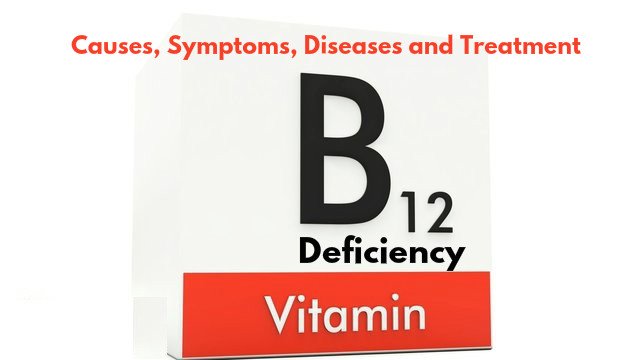Vitamin B12: Causes, Symptoms, Diseases and Treatment
Vitamins are essential for a healthy body. Vitamin B12 is one of the vitamins that belong to the B complex group of vitamins. It is the only vitamin in which there is trace amounts of cobalt also. So, this vitamin is also known as cobalamin.
What is Vitamin B12?
- Vitamin B12 is water soluble and plays an important role in the proper functioning of your brain and nervous system. This vitamin, along with folates, aid in the DNA synthesis and the production of red blood cells.
- You will not get this vitamin from plants or sunlight. It is produced in the gut of animals. Bacteria, yeast and algae also produce this vitamin.
- It has a part in the formation of myelin sheath around the nerves and thus helps in the conduction of nerve impulses.
- Most of the water soluble vitamins are excreted from the body after the body absorbs the required amount. But vitamin B12 is not thrown out of the body when it is in excess. It can be stored in the liver for as long as 5 years.
- You get this vitamin in different forms and it is known by various names also.
Causes of Vitamin B12 deficiency:
Bowel Disorder:
People suffering from Crohn’s disease and those who have had their bowels shortened surgically may find it difficult to absorb B12 properly into their blood stream. Patients suffering from short bowel syndrome may face problems lie diarrhea, cramps and heartburn. They often suffer from malnutrition as the body is unable absorb sufficient quantity of vitamins.
Bacterial infection:
Bacterial infection can cause Vitamin B12 deficiency as they damage the cells that produce intrinsic factors.
Chronic alcoholism:
It is said that chronic alcoholism can cause vitamin B12 deficiency according to National Library of Medicine.
Coffee:
Research made recently shows that if you consume more than 3 cups of coffee daily, there will be 15% decrease in the levels of B vitamins, including Vitamin B12.
Exposure to nitrous oxide:
Nitrous oxide, commonly known as anesthesia, can also destroy Vitamin B12 that you have stored in your body. Dentists often use this gas in the operating rooms and for pain management. It can cause serious problems for those who suffer from vitamin B12 deficiency. Health workers who are exposed to this gas are also at a risk.
Inadequate stomach acid:
When your stomach may contain inadequate stomach acid, you may suffer from vitamin B12 deficiency. This is because stomach acid is required for the liberation of this vitamin from the food you consume. This is more common among the older people. Above 30% of people above 50 years suffer from atropic gastritis, which is the thinning of stomach lining. People on medications like proton pump inhibitors, H2 blockers or other antacids also find it difficult to absorb Vitamin B12. So, they need to take B12 fortified foods and Vitamin B12 supplements.
Intrinsic factor deficiency:
A glycoprotein called intrinsic factor is secreted by the cells of the stomach. This combines with Vitamin B12 and then reaches the small intestine, where it is absorbed. When this absorption does not take place properly, then your body becomes deficient in Vitamin B12. This can lead to pernicious anemia, which can result in serious neurological damage. In pernicious anemia, the immune system produces antibodies that can attack the lining of the stomach. This causes damage of the cells that produce intrinsic factor.
Vegan eating:
Vitamin B12 deficiency is more common among people who take only vegetarian diet. This is because Vitamin B12 is found only in animal products like meat, liver, fish, beef, shrimps, scallops, lamb, salmon, poultry, eggs and dairy products. So, vegans must make sure that take in B12 fortified foods or B12 supplements regularly.
Symptoms of Vitamin B12 Deficiency
- Inability of the bladder to hold urine, which can cause leakage.
- Forgetfulness and confusion
- Difficulty in walking
- Tingling sensation and numbness on the fingers and toes
- Depression and mood swings
- Hallucinations in advanced conditions
- Pale skin
- Weight loss, stomach upset
- Rapid breathing and heartbeat
- Tremors
- Decrease in blood clotting
- Swollen and inflamed tongue
- Weakness and light headedness
- Difficulty in thinking and reasoning
- bruising easily
Diseases Caused by Vitamin B12 Deficiency:
- Age related macular degeneration
- Breast cancer
- Parkinson’s disease
- Male infertility
- Chronic fatigue
- Anemia
- Insomnia
- Cardiovascular and cerbrovascular diseases
- Complications in pregnancy and birth defects
- Dementia, Alzheimer’s and other neurological conditions
Vitamin B12 deficiency Treatment:
Blood transfusions:
When Vitamin B12 deficiency is severe and you suffer from acute anemia, then the red blood cell count may reach very low. In such cases, it is important that you undergo blood transfusion for the first couple of days, till Vitamin B12 injections start working.
Diet changes:
To treat Vitamin B12 in a natural way, you have to include milk, meat and dairy products in your daily diet. Vegetarians can take in Vitamin B12 supplements. With age, the ability to absorb also reduces. So, elderly people have to take more amount of Vitamin B12.
Oral antibiotics treatment:
If the cause for vitamin B12 deficiency is the overgrowth of intestinal bacteria, then you can treat it by taking oral antibiotics like tetracycline. This will prevent the growth of bacteria and also ensures that Vitamin B12 is absorbed properly.
Oral vitamin B12 supplements:
If you do not want to take injections, then you can take high doses of oral Vitamin B12 supplements according to the advice of your doctor.
Treated with Injections:
Patients who suffer from severe cases of Vitamin B12 deficiency can take injections. They are given 5 to 7 injections on the first week. These injections are very effective and you get results within 48 to 72 hours. Once the level of Vitamin B12 reaches normal, then this injection is taken every 1 or 3 months.




